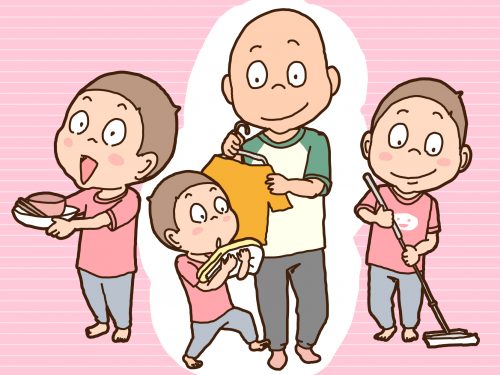Table of Contents
Parenting manga “Helping is a Family Affair”
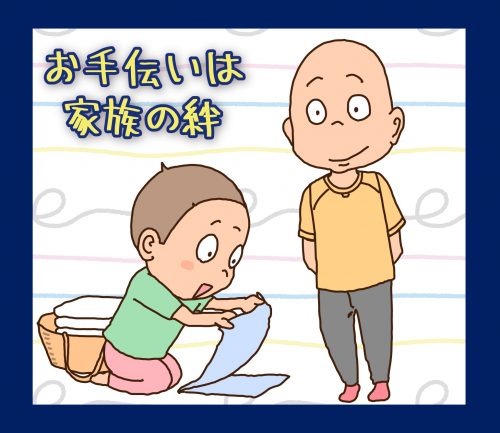
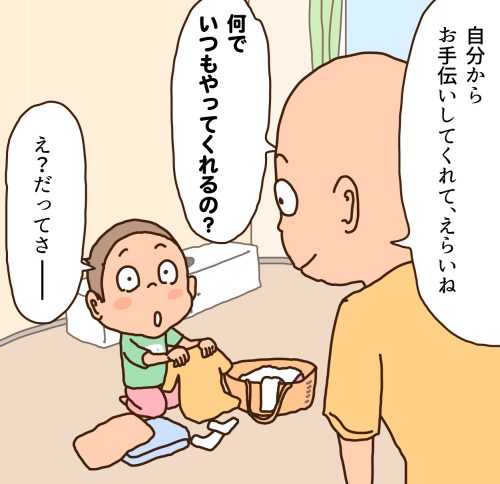
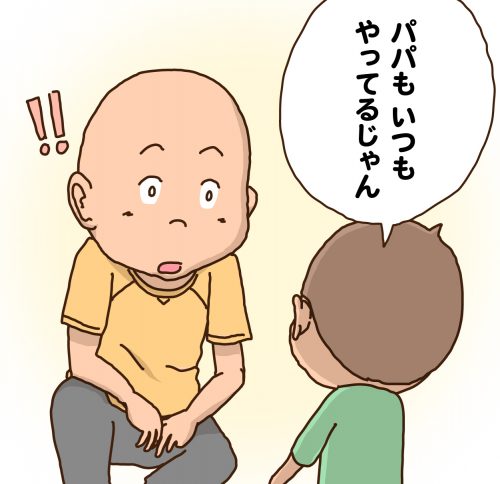
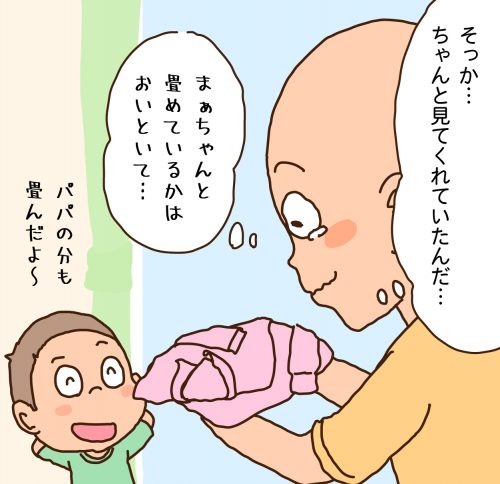


Profile
Eiichi
After working for a design company in Tokyo, he became a freelance illustrator. He is a hard-working father who creates animation, manga, and illustrations, including winning the Yubari International Fantastic Film Festival’s International Short Film Showcase Division Excellence in Animation Award.
Helping is a “good thing”.
Parents are happy when their children help with household chores. But it doesn’t happen naturally. What can dads do to help their children enjoy helping out? And what positive effects will it have on their children’s development?
This time,
The benefits of having children help and,
This section explains the key to motivating children!
We asked Ms. Megumi Sato, a licensed psychologist who runs “Childcare Counseling Room Posicafe” and provides consulting services specializing in child psychology, about “helping” children.
We also provide age-specific recommendations for “help” and effective ways to motivate them!

Helping is a “good thing”.
Having your child help you is truly a “win-win” situation. Here are some of the main benefits.
1. fosters a sense of self-affirmation and self-efficacy
By helping others, they feel useful and inevitably receive more praise, which fosters a sense of self-affirmation (a sense of affirming one’s existence, including not only strengths but also weaknesses and complexes) and self-efficacy (a sense of believing that “I can do it” and “I will do it well”).
These will lead to the ability to overcome adversity in the future.
2. good lifestyle habits take root and lead to independence
There are children who are unable to take care of themselves even as late as junior high school and are conflicted, resulting in strong rebellion.
Helping others from an early age will help them acquire the ability to do things for themselves and promote independence, both in terms of life and spirit.
3. no longer be bound by stereotyped gender role perceptions
When everyone in the family does household chores, they are no longer bound by stereotypical gender role divisions, such as “women are supposed to do the housework.
4. trust between parents and children is built.
Having a role in the family makes it easier to embrace the perception of being part of the family.
In addition, the opportunity to share a sense of accomplishment through helping and the increased frequency of communication will help build trust between parents and children.
5. lightens the burden on mom and dad
In the long run, having children help out will reduce the burden of housework on mom and dad.

Points to consider when asking for assistance
Next, here are some pointers and tips on how to encourage and successfully motivate your child to help.
1. praise what was done! Do not tell them what they did not do.
Giving lots of praise for what has been done will help foster a sense of self-affirmation and self-efficacy.
Not simply saying, “Great job! but also, for example, “Thanks to 00-chan wiping with the rag, so many stains have been removed. Thank you, Daddy. Thank you. By doing so, it will be easier for them to realize how valuable their help was.
On the other hand, “blaming” or “getting angry” for failure is not acceptable.
2. Warmly watch over them until they can do it.
If you interrupt your child’s behavior by saying, “No, not like that, like this,” etc., when he or she is working on a task, you will lower his or her motivation and self-efficacy. Even if they make some mistakes or are slow, warmly watch them until they can do it on their own. This is also a point to keep in mind when playing with children, such as drawing or making crafts.
3. the reward is experiential.
If you give him an allowance or something as a reward for helping out, the reward itself becomes an objective, and he may start thinking, “I want to be useful to Mom and Dad! or “I want to be able to do more of the things I want to do! This will reduce the pure motivation of “I want to be useful to my mom and dad! The most basic thing to do is to thank them with words such as “Thank you” and “I appreciate your help,” but if you are tempted to reward them with something from a parental point of view, try to reward them with an “event that makes them happy” rather than giving them something. For example, “Since you helped me clean up so quickly, let’s play together! or “Let’s make your favorite gratin tonight! I recommend that you make it an experience that can be digested. However, be careful not to do this too often, or the effect of the reward itself will diminish.
4. incorporate ideas for children’s enjoyment
If your child is having a hard time getting motivated to help out, you may want to try the following ideas.
● Incorporate game elements
For example, when you want to ask for help wrapping dumplings, how about having a timer handy and saying, “Let’s see how many dumplings you can wrap in one minute! How about encouraging your child to try wrapping dumplings? Depending on your child’s personality, “How neatly can you wrap the dumplings?
Visualization of results
If you prepare a helping chart and put one sticker per helping, etc., it would be helpful to visualize the results and keep your child motivated.
Take advantage of events such as birthdays
Even if it is something a little difficult that you would not normally do, you may be able to do it during an extraordinary event. It would be wonderful to “make a cake for Mom’s birthday in cooperation with Dad!
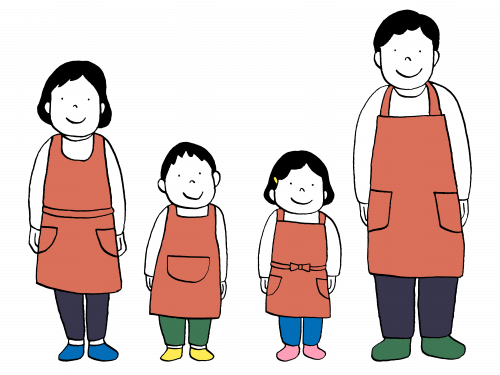
Recommendations for Helping & Encouraging Help by Age
1-2 years old
<Recommended assistance
Throw the garbage in the trash.”
‘Put the toys on the floor in a box.’
I wipe up spilled drinks with a tissue.”
<Points
The ego is developing rapidly, and the child says, “I want to do this, I want to do that, I want to do this! I want to do this too! This is the time when the child’s ego is rapidly developing and the number of “I want to do this and that! It is a good idea to let your child do what he or she wants to do, taking into account his or her feelings.
When encouraging help, be specific, such as “Put ________ and ________ in this box,” rather than using vague words such as “clean up. Finally, tell them, “You did a good job of cleaning up. By saying, “You did a good job!” the child will recognize the act as “cleaning up.
3-5 years old
<Recommended assistance
Simple cooking, such as mixing and kneading” (we recommend pound cake, cookies, etc., which children like and enjoy).
Carrying the finished dishes.”
Simple cleaning with tools.”
Fold laundry (square items such as towels and handkerchiefs are easy to fold as an extension of origami)
<Points
They will not be interested in repeating what they have already mastered. For example, if you want to fold laundry, it is a good idea to gradually increase the level of difficulty and challenge them by folding towels/handkerchiefs, T-shirts, socks, and so on.
Once they stop helping, it is hard to get them to return. It is good to give them an ongoing role, even if it is a small thing such as checking the mailbox daily.
[6-7 years old
<Recommended assistance
Food preparation (e.g., pea strips, egg crackers, etc.)
Prepare the table (wipe the table clean, set the dishes on the table, bring the ready-made dishes to the table, etc.).
“Cleaning the bath.”
Fold and put away laundry.
<Points
When you ask them to “prepare the table,” you should not simply tell them to “prepare the table,” but at first you should tell them in detail, for example, “Put out the chopsticks, spoon, and plate. It is better to tell them in detail, for example, “The plate is in the middle, chopsticks are in front of the plate, and the spoon is on the right side. Once they get used to it, you can tell them, “Today’s menu is ____________, so what do you need?” and then ask them to bring out the necessary dishes.
The key person who encourages children to help is the father!
If both mom and dad are doing household chores on a daily basis in the home, it is easier for children to recognize that it is a natural part of being part of a family.
On the other hand, in a family where housework is done almost solely by mom…, the child may also feel that “housework = mom’s role, and since dad is not doing it, I won’t do it either.
If there are fathers who want to do household chores but don’t know what to do…, how about first getting involved in the household chores as a “watchful guardian of the children’s help”?
With the father watching over the child, the mother can leave the child to help, the housework gets done, and above all, the bond between parent and child is strengthened!




